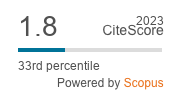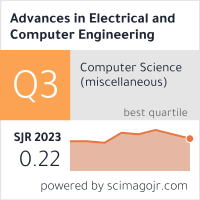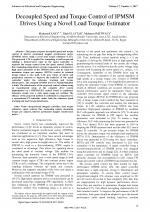| 3/2017 - 3 |
Decoupled Speed and Torque Control of IPMSM Drives Using a Novel Load Torque EstimatorZAKY, M. |
| Extra paper information in |
| Click to see author's profile in |
| Download PDF |
Author keywords
proportional integral controller, load torque estimator, speed control, flux weakening region, maximum torque per ampere, interior permanent magnet synchronous motor
References keywords
control(21), speed(13), motor(13), drive(13), ipmsm(11), drives(11), synchronous(10), permanent(10), magnet(10), uddin(9)
Blue keywords are present in both the references section and the paper title.
About this article
Date of Publication: 2017-08-31
Volume 17, Issue 3, Year 2017, On page(s): 19 - 28
ISSN: 1582-7445, e-ISSN: 1844-7600
Digital Object Identifier: 10.4316/AECE.2017.03003
Web of Science Accession Number: 000410369500003
SCOPUS ID: 85028559220
Abstract
This paper proposes decoupled speed and torque control of interior permanent magnet synchronous motor (IPMSM) drives using a novel load torque estimator (LTE). The proposed LTE is applied for computing a load torque and yielding a feed-forward value in the speed controller to separate the torque control from the speed control. Indirect flux weakening using direct current component is obtained for high speed operation of the IPMSM drive, and its value for maximum torque per ampere (MTPA) control in constant torque region is also used. LTE uses values of direct and quadrature currents to improve the behavior of the speed controller under the reference tracking and torque disturbances. The complete IPMSM drive by Matlab/Simulink is built. The effectiveness of the proposed control scheme using an experimental setup of the complete drive system implemented on a DSP-DS1102 control board is confirmed. Extensive results over a wide speed range are verified. The efficacy of the proposed method is confirmed in comparison to a conventional PI controller under both the reference speed tracking and load torque disturbance. |
| References | | | Cited By |
Web of Science® Times Cited: 2 [View]
View record in Web of Science® [View]
View Related Records® [View]
Updated 3 days, 3 hours ago
SCOPUS® Times Cited: 3
View record in SCOPUS® [Free preview]
View citations in SCOPUS® [Free preview]
[1] Two-Degrees of Freedom and Variable Structure Controllers for Induction Motor Drives, ZAKY, M., TOUTI, E., AZAZI, H., Advances in Electrical and Computer Engineering, ISSN 1582-7445, Issue 1, Volume 18, 2018.
Digital Object Identifier: 10.4316/AECE.2018.01009 [CrossRef] [Full text]
[2] Design Criteria for EV Drivetrain, Payarou, Tamanwe, Singh, Sumeet, Muthusamy, Mohanraj, Pillay, Pragasen, IECON 2021 – 47th Annual Conference of the IEEE Industrial Electronics Society, ISBN 978-1-6654-3554-3, 2021.
Digital Object Identifier: 10.1109/IECON48115.2021.9589980 [CrossRef]
Disclaimer: All information displayed above was retrieved by using remote connections to respective databases. For the best user experience, we update all data by using background processes, and use caches in order to reduce the load on the servers we retrieve the information from. As we have no control on the availability of the database servers and sometimes the Internet connectivity may be affected, we do not guarantee the information is correct or complete. For the most accurate data, please always consult the database sites directly. Some external links require authentication or an institutional subscription.
Web of Science® is a registered trademark of Clarivate Analytics, Scopus® is a registered trademark of Elsevier B.V., other product names, company names, brand names, trademarks and logos are the property of their respective owners.
Faculty of Electrical Engineering and Computer Science
Stefan cel Mare University of Suceava, Romania
All rights reserved: Advances in Electrical and Computer Engineering is a registered trademark of the Stefan cel Mare University of Suceava. No part of this publication may be reproduced, stored in a retrieval system, photocopied, recorded or archived, without the written permission from the Editor. When authors submit their papers for publication, they agree that the copyright for their article be transferred to the Faculty of Electrical Engineering and Computer Science, Stefan cel Mare University of Suceava, Romania, if and only if the articles are accepted for publication. The copyright covers the exclusive rights to reproduce and distribute the article, including reprints and translations.
Permission for other use: The copyright owner's consent does not extend to copying for general distribution, for promotion, for creating new works, or for resale. Specific written permission must be obtained from the Editor for such copying. Direct linking to files hosted on this website is strictly prohibited.
Disclaimer: Whilst every effort is made by the publishers and editorial board to see that no inaccurate or misleading data, opinions or statements appear in this journal, they wish to make it clear that all information and opinions formulated in the articles, as well as linguistic accuracy, are the sole responsibility of the author.





